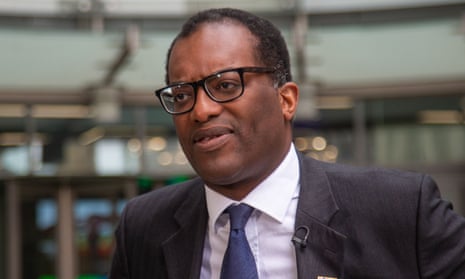The government faces intense pressure from its own MPs and opposition parties to take action over misogyny and harassment in Westminster after a senior minister denied institutional problems, saying the problem was simply “some bad apples”.
A day after the Conservative MP Neil Parish resigned for watching pornography in the Commons, and as yet more allegations emerged about seemingly endemic sexual misconduct, a Tory ex-minister said Kwasi Kwarteng’s comments “dismissed and belittled” the experiences of female MPs.
Labour warned that a toxic culture in Westminster was exacerbated by inaction from Downing Street, while its deputy leader, Angela Rayner, wrote to Boris Johnson about reports that one No 10 Christmas party saw a ‘sexist of the year’ award handed out.
Kwarteng, the business secretary, faced significant criticism after rejecting the idea of inherent sexism in parliament, arguing that problems were mainly caused by long hours and overwork, and that very few MPs transgressed.
“I don’t think there’s a culture of misogyny,” he told Sky News. “I think the problem we have is that people are working in a really intense environment, there are long hours and I think generally, most people know their limits.”
Speaking later to Times Radio, he said the problem was “some bad apples”, who should be punished, adding: “But that doesn’t mean that the entire culture is extremely misogynistic or full of male entitlement. I don’t recognise that.”
Caroline Nokes, the Tory former minister who chairs the women and equalities committee, said Kwarteng’s view went against the testimony of numerous MPs.
“Colleagues shared examples of the aggressions and microaggressions they face every day, and it’s being dismissed by a senior cabinet member as the result of working long hours,” she said. “Once more the experiences of female MPs are dismissed and belittled. That in itself is a classic example of institutional sexism.”
Wendy Chamberlain, the Liberal Democrat chief whip, said Kwarteng was “deluding himself”. She said: “This is not a few bad apples, it is a culture that is rotten to the core. In the same week that two of his MPs resigned and his female colleagues complained, the worst thing he can do is trivialise and dismiss this.”
Keir Starmer argued that with a series of misconduct cases, the government had either tried to ignore the issue or to delay any robust action, saying “their first instinct is to push it off into the long grass, hide what’s happening”.
“That is a political problem, because a fish rots from the head, and there needs to be political leadership on this as well,” he told Sky News. “And we haven’t seen that yet from the Conservative party.”
Senior Tories have been pushing to get more female MPs, but Kwarteng said he is not “a fan of quotas” to boost their numbers.
Speaking to LBC radio on Sunday, the senior Labour MP Chris Bryant said that when he was first elected in 2001 he was “regularly touched up by older, senior gay – they weren’t out – MPs”, adding: “I never felt I was able to report it because you end up being part of the story, that’s the last thing you want.”
The Sunday Times reported a series of claims, including that one MP was accused of licking the faces of male researchers in bars; that a female Tory MP was sent a “dick pic” by a colleague; and that another MP had been warned about his use of sex workers.
The Commons Speaker, Lindsay Hoyle, has suggested one way to safeguard staff would be to change the current system by which MPs employ their staff directly, instead doing this centrally. He said he is considering an outside body employing aides as he moved to establish a “Speaker’s conference” bringing MPs together to discuss an overhaul.
In Rayner’s letter to Johnson, she asked for details about another claim in the Sunday Times, that at a Downing Street party in December 2020 one aide was presented with a “sexist of the year” award.
Rayner also queried whether this had been reported to Sue Gray, the senior civil servant investigating alleged lockdown-breaking gatherings in parallel with a police inquiry.
“You have claimed on the record this week that there is ‘no place’ for sexism in politics, and yet there are now serious and credible allegations in the Sunday Times that sexist behaviour has not only taken place in your own office, but has been celebrated and rewarded,” Rayner wrote.
“You are ultimately responsible for the culture and activity that takes place within Downing Street under your administration. If true, these allegations are not only at odds with your professed opposition to sexism, but set a terrible example and must result in further action.”
The furore over institutionalised sexism in politics kicked off a week ago with a much-criticised Mail on Sunday story citing unnamed Tory MPs saying Rayner would cross and uncross her legs during prime minister’s questions to distract Boris Johnson.
The paper leaped to its own defence this week, insisting Rayner was the source of the anecdote and that it had been unfairly targeted by opponents of a free press. A Labour source said: “The vile suggestion that Angela Rayner initiated the sexist smears that have been made against her must be some kind of sick joke.”
Parish’s departure will pave the way for a byelection in the Tory safe seat of Tiverton and Honiton, and he still faces an investigation by the Independent Complaints and Grievance Scheme (ICGS).
It was the latest in a series of damning developments that have dogged the Commons in recent weeks.
Senior Labour MP Liam Byrne is set to be suspended from the Commons for two days for bullying a member of staff; David Warburton had the Conservative whip withdrawn after allegations of sexual harassment and cocaine use emerged; and former Tory Imran Ahmad Khan resigned after being convicted of sexually assaulting a 15-year-old boy.
The ICGS has told MPs it is “seeing a similar trend” to the previous year when cases were started against 15 MPs.








